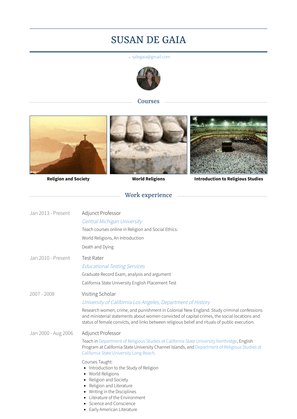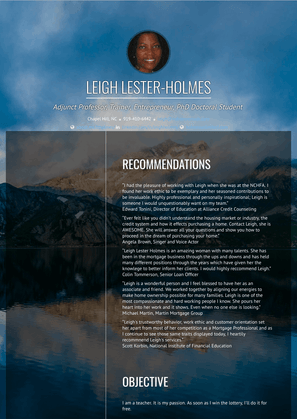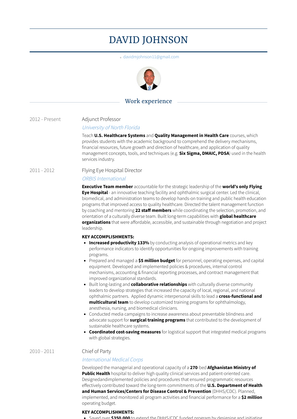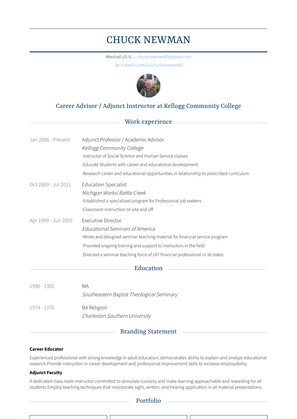Adjunct Professor Resume Examples and Templates
This page provides you with Adjunct Professor no experience resume samples to use to create your own resume with our easy-to-use resume builder. Below you'll find our how-to section that will guide you through each section of a Adjunct Professor no experience resume.




Overview
If you want to find work in the world of academia, but don’t have any prior teaching experience, an adjunct professor role is a great first step into your dream career. Tenured or long-term college-level teaching jobs can be hard to come by, especially for people new to teaching – but adjunct roles are widely available, in part because they offer colleges a convenient way to respond to their teaching needs. And as an adjunct, you won’t need to be tied down to the same place for too long, which means you have the flexibility to build a broad experience base before looking for a more permanent post.
The US Bureau of Labor Statistics offers a strong outlook for roles in post-secondary teaching. Adjunct professors can expect to see jobs in their field grow by an incredible 12% over the coming decade. And while adjunct staff can expect lower rates of pay than their more permanent colleagues, the median salary across all post-secondary teaching roles still adds up to a respectable $79,640 per year.
But even with jobs growing at a rapid rate, academia is a heavily overcrowded field. That means the hiring process – particularly at higher-profile schools – can be intensely competitive. It can leave people with limited teaching experience feeling anxious about their chances of finding work.
To give you a head start, we’ve written this helpful guide to building your first adjunct professor resume. We’ve compiled example resume segments, do’s and don’ts for the resume-writing process, and tips on how to make your resume even stronger. Stick with us, and your first teaching resume will take you to the top of the class!
Note: Leverage AI to level-up your resume - Try our AI Resume Builder
What is an Adjunct Professor?
Adjunct professors are temporary, contractually-hired teaching staff who teach courses to post-secondary students. Because they work on a contractual basis, they usually don’t have the job security of their full-time or tenured colleagues. However, these roles are an invaluable first step into an academic teaching career – because there are so many adjunct jobs available, it’s easier to be hired as an adjunct professor if you lack experience.
Adjunct professors can be found working in settings including:
- Colleges and universities
- Community colleges
- Junior colleges
- Professional schools
Unsurprisingly, teaching at a post-secondary level requires some post-secondary education. Ideally, adjunct professors should have a doctoral degree, or be in the process of completing one. However, it isn’t always a strict requirement – some adjunct professors have master’s-level degrees instead, sometimes coupled with experience relevant to their subject in the professional or corporate world.
To succeed as an adjunct professor, you will need to be able to plan and deliver an engaging and educational course – you won’t necessarily need teaching experience to obtain the skills involved in doing this work. You’ll need to be organized, proactive, and capable of managing your time effectively both in and out of the classroom. You’ll also need to be compassionate, as you may need to offer academic or pastoral support to your students if they struggle.
How to Write an Adjunct Professor Resume
If you’re hoping to land an adjunct professor role with no teaching experience, you need to showcase two important facts in your resume. Firstly, you need to show that you have the qualifications necessary to work as an adjunct. Secondly, you need to prove that you have the skills you’ll need to do well.
As we’ve discussed, adjunct roles are less strict than permanent teaching roles in their educational requirements. Still, your educational background – whatever it is – should be at the heart of your adjunct professor resume. Not only does it show that you’re qualified to teach at a post-secondary level; it shows that you have some first-hand familiarity with the culture of academia, which will help you out as you move from learning to teaching.
But that doesn’t mean you should neglect your skills or experience sections! In particular, you should remember that not all relevant experience comes from holding down a job. If you have volunteering, internship or college extracurricular experience that has helped you to build a relevant profile of skills, you can and should include it on your resume.
As a rule, an adjunct professor resume written by someone with no previous work experience should contain the following:
- A summary
- Your education
- Your skills, including any certifications or licenses
- Any experience you have
The Best Format for an Adjunct Professor Resume
The format of your resume can direct hiring managers’ attention to your strongest features – and away from the areas where you have room to improve. When choosing your professionally-designed adjunct professor resume from our selection, it’s important to keep that in mind! Think about what you want a potential employer to notice first about you, and choose your layout accordingly.
If you’re hoping to work as an adjunct professor but don’t have much experience, you should look for a resume format that draws focus to your educational background and away from your experience section. Later in your career, once you have more relevant work experience, you can reconfigure your resume so it focuses equally on all sections.
Keep in mind that some hiring managers use an applicant tracking system (or ATS) to filter the resumes they receive for each position. The software looks for keywords in your resume, usually drawn from the job description, to winnow out resumes that are generic or underqualified. This helps recruiters speed up the hiring process – but it also means that if your resume doesn’t get past the ATS software, it may never be seen by a real person.
ATS software can also be confused by intricate resume formatting. That’s why we’ve made sure that all of VisualCV’s resume templates are built to beat ATS software. When you use one of our templates, you can be confident that your layout won’t undermine your chances of success.
3 Adjunct Professor Resume Summary Examples
Most resumes open with a summary – which makes your summary one of the first things a recruiter will see about you. It should be a short, concise description of your best qualities, and it should reflect the requirements outlined in the job description. That means you can’t reuse the same summary for multiple applications, unfortunately!
Because you won’t have much relevant work experience, your summary should focus on your education and your skills. When you have more experience behind you, you can refocus your summary on that, instead.
Do:
- PhD candidate at New York University, specializing in microbiology. Extensive volunteer experience supporting at-risk teens in a recreational setting. A highly organized and driven worker, hoping to build a career in post-secondary teaching.
- Recent graduate from the Harvard MBA program. Former intern at Walker’s Bank HQ, with experience in presentation, planning and project management. Excited to move into a teaching career.
- PhD graduate in Romantic literature from UCLA. Former co-convenor of the Romantic Literature Research Seminar, with experience in developing and executing educational events. Deeply dedicated to supporting the next generation in their learning.
How Not to Write an Adjunct Professor Resume Summary
The number one thing to avoid when writing a summary is letting it run too long! Remember, it needs to be clear and direct, with a focus on what you have to offer in the role you want. Don’t get too personal or too wordy – if you want to tell a hiring manager more about yourself as a person, you can do it in your cover letter instead.
It’s also worth noting that recruiters are divided on whether you actually need to have a summary on your resume. If you’re really struggling with it, you can probably get away with leaving it out.
Don’t:
- I have always loved learning, and my time as a student has taught me that I want to build a career on helping foster a love of learning in others. I believe I have the communication skills, personal organization and love of my specialist subject to thrive as an adjunct professor.
Do You Need a Resume Objective?
When you’re applying for more senior positions, you won’t usually need a resume objective. But when you’re at the beginning of your career journey, an objective can tell hiring managers a little more about you.
But how is an objective different from a summary? A summary, as we’ve discussed, is a short description of what makes you the right choice for the job. An objective is a one-sentence statement about your long-term career goals, such as the industry or type of role you’re aiming for in the future.
Adjunct Professor Resume Objective Example: Current doctoral candidate hoping to build a lifelong career in post-secondary teaching.
How to Describe Your Experience on Your Adjunct Professor Resume
When your work experience is limited, this section can feel a little daunting. But it’s important to remember that experience doesn’t have to come from paid work! If you’ve ever been a volunteer, an intern, or a member of an extracurricular group in college, you’ve probably acquired at least some relevant experience.
If you’re not sure what counts as relevant, check the job description. Does your experience prove that you have a skill or quality required for the role? If so, then you can and should include it on your resume.
Describe Your Experience Effectively
Each ‘item’ of experience on your resume should come with a bullet-pointed list of the tasks you carried out – but it isn’t quite that simple! Remember, you have to write about what you accomplished while carrying out each task. Think about the skills you used, the goals you achieved, and the improvements you made.
This is important because it lets recruiters see hard facts about your previous successes. Having proof that you’ve done well in previous roles will encourage them to believe that you can do well again in the future.
Do: Co-Convenor, Romantic Literature Research Seminar | 2020-21
- Reached out to external speakers to build a compelling and educational program for the seminar series each term; liaised with speakers to arrange food and travel expenses in advance
- Worked closely with my co-convenor to ensure that rooms were booked and catering was provided for all seminar meetings
- Produced compelling promotional material for each term’s seminar series, ensuring high levels of attendance at each event
How Not to Describe Your Experience
You should always avoid writing a simple list of the tasks you performed! Without any further context, that won’t tell a hiring manager anything new about you. The whole point of an experience section is to show hiring managers that you have been able to apply your skills successfully in the past; if you focus on the tasks and nothing else, you could jeopardize your chances of landing the job.
Don’t: Co-Convenor, Romantic Literature Research Seminar | 2020-21
- Booked external speakers
- Organized logistics with co-convenor
- Produced posters
How to List Skills on Your Adjunct Professor Resume
As a general rule, you can identify the skills required for any given role by looking at the job description. Hiring managers will usually include a list of skills considered necessary for the role, along with a secondary list of desirable skills that can boost your application’s strength. Make sure you double-check the job description before you sit down to work on this section!
For general information about skills on your resume, check out our resume skills guide here!
Top Adjunct Professor Resume Skills in Demand
| Adjunct Professor Hard Skills | Adjunct Professor Soft SKills |
|---|---|
| Student engagement | Communication |
| Delivering presentations | Organization |
| Classroom management | Problem-solving |
| Lesson plan development | Time management |
| Student support and assistance | Collaboration and teamwork |
| Student evaluation | Creativity |
| Pedagogical strategies | Adaptability |
| Expertise in field | Analytical thinking |
Professional Certifications for Adjunct Professors
If you want to work as an adjunct professor, you have likely already invested a lot of time and money into your education. However, there may be further steps you can take to boost your employability and increase your chances of success. That includes looking into certifications relevant to your field.
For adjunct professors, this usually means looking into your institution’s Adjunct Certification Program or Doctoral Training Program. These courses offer a grounding in the principles of teaching others, which will attest to the skills you will need to thrive in an adjunct role. However, these courses are usually open only to current adjunct faculty – meaning you will need to get your first adjunct professor job before you can complete a certification or training program.
Outside of these options, you should consider looking into certifications that focus on other relevant skills. Any certifications focusing on presentation skills or project management will probably be a good fit for a would-be adjunct professor!
The Most Important Soft Skills for Your Adjunct Professor Resume
Hard skills are obviously important, but it’s important not to neglect your soft skills! These skills will give you an advantage in every aspect of your working life. And if you don’t have much work experience, soft skills can offer hiring managers even further proof that you have what it takes to succeed in the role you want.
Here are some of the most important soft skills to include on your adjunct professor resume!
Communication
As an adjunct professor, your job will be centered around imparting complex ideas to others in clear and accessible ways. You’ll need to do this for an audience that could be fairly large, and you’ll need to keep that audience engaged the whole time. Strong communication skills are a necessity in this line of work, so make sure you’ve honed yours before you apply!
Organization
To deliver the best possible lessons, you’ll need to have robust lesson plans in place ahead of time. You’ll also need to stay on top of your own deadlines – remember, there’s no point in having your students turn in assignments if you don’t mark them promptly. Organization will help you to be a better teacher, which will encourage your students to respect you.
Problem-Solving
Planning ahead is all very well, but anyone who has ever worked in a classroom knows that it can be an unpredictable environment. You may need to deal with tech equipment failures, student illness, an unruly class, or even an unexpected fire alarm in your building! Problem-solving skills will help you to react to whatever comes your way as an adjunct.
How can I highlight my qualifications for an adjunct professor role if I have no teaching experience?
To highlight your qualifications, focus on your academic achievements, subject matter expertise, and any relevant professional experience. Emphasize your educational background, such as advanced degrees, certifications, or research experience in your field. Mention any presentations, guest lectures, or workshops you’ve conducted, as well as your ability to communicate complex ideas clearly.
What are the key skills to feature on an Adjunct Professor resume with no experience?
Key skills to feature include subject matter expertise, public speaking, curriculum development, and academic writing. Additionally, highlight your ability to engage students, organize course materials, and manage time effectively. Emphasize your commitment to lifelong learning, adaptability, and any experience you have in mentoring or advising others.
How can I demonstrate my readiness to teach on an Adjunct Professor resume without formal teaching experience?
Demonstrate your readiness to teach by discussing any informal teaching roles, such as tutoring, mentoring, or leading study groups. Mention any experience you have in giving presentations, conducting training sessions, or participating in academic discussions. Highlight your ability to convey information clearly and your enthusiasm for sharing knowledge with students.
Should I include any academic projects or research on my Adjunct Professor resume?
Yes, including academic projects or research is important, especially if you have no formal teaching experience. Detail your research topics, methodologies, and findings, and discuss how this work has prepared you to teach in your field. Mention any publications, conference presentations, or collaborations with other academics that demonstrate your expertise and contribution to your discipline.
How can I showcase my ability to develop course content on my resume?
You can showcase your ability to develop course content by describing any experience you have in creating educational materials, such as study guides, lesson plans, or curriculum outlines. Mention any involvement in curriculum development during your studies, such as assisting a professor or creating content for a group project. Highlight your understanding of course objectives, student needs, and how to structure content to achieve learning outcomes.
What kind of achievements should I highlight on a resume for an Adjunct Professor with no experience?
Highlight achievements such as completing advanced degrees, publishing research, or receiving academic awards. You could also mention any recognition you received for presentations, contributions to academic conferences, or involvement in academic organizations. Achievements that demonstrate your commitment to your field and your ability to contribute to an academic environment are particularly valuable.
How do I address a lack of formal teaching experience on my Adjunct Professor resume?
If you lack formal teaching experience, focus on your academic credentials, subject matter expertise, and any related experience where you’ve communicated or shared knowledge. Discuss any professional experience where you trained colleagues, presented information, or led projects. Emphasize your passion for teaching, your strong understanding of the subject matter, and your desire to engage with students.
How important is industry experience for an Adjunct Professor role?
Industry experience can be very valuable for an Adjunct Professor, especially if you’re teaching a subject related to your professional background. Highlight your practical experience in the field, including any projects, leadership roles, or specialized skills that are relevant to the courses you want to teach. Mention how your industry knowledge can provide students with real-world insights and applications of theoretical concepts.
How do I demonstrate my ability to connect with students on my resume?
Demonstrate your ability to connect with students by mentioning any experience you have in mentoring, advising, or supporting others in their academic or professional development. Discuss your communication skills, empathy, and ability to understand diverse perspectives. Highlight any feedback you’ve received in informal teaching roles or interactions that show your ability to build rapport and foster a positive learning environment.
Should I include certifications on my Adjunct Professor resume with no experience?
Yes, including certifications can enhance your resume by demonstrating your qualifications and commitment to professional development. Certifications related to teaching, such as online teaching certifications, or those specific to your field, can add value to your resume and make you stand out to potential employers.
Adjunct Professor Salaries
While adjunct professor roles are growing, salaries do tend to skew lower. You should also take into account that adjunct professor roles entail less job security and fewer benefits than full-time, permanent teaching roles. Treat these jobs as a stepping-stone into a more stable, better-paid post-secondary teaching career, and manage your expectations accordingly.
According to Indeed, the average salary for adjunct faculty – as opposed to other post-secondary teaching roles – is $39.79 per hour. Rates of pay may vary between institutions. Some may pay by the hour, while others might prefer to pay a flat rate for each course you teach.
Final Thoughts
Adjunct professor roles may not be great in the long term – but in the short term, they are an invaluable way to build the experience you will need to apply for more permanent teaching jobs. The barriers to entry are lower, which means that adjunct teaching can be an important first step on your career journey. And if you truly love teaching, the job satisfaction will help to make up for the limitations on your pay.
VisualCV is here to support you with every element of your job application process. With a VisualCV Pro membership, you can tailor every aspect of your resume, which means you can show recruiters your very best self when you apply. Give yourself the head start you deserve today!
-
How to Describe Your Experience on Your Adjunct Professor Resume
-
The Most Important Soft Skills for Your Adjunct Professor Resume
-
What are the key skills to feature on an Adjunct Professor resume with no experience?
-
Should I include any academic projects or research on my Adjunct Professor resume?
-
How can I showcase my ability to develop course content on my resume?
-
How do I address a lack of formal teaching experience on my Adjunct Professor resume?
-
How important is industry experience for an Adjunct Professor role?
-
How do I demonstrate my ability to connect with students on my resume?
-
Should I include certifications on my Adjunct Professor resume with no experience?
Copyright ©2024 Workstory Inc.
